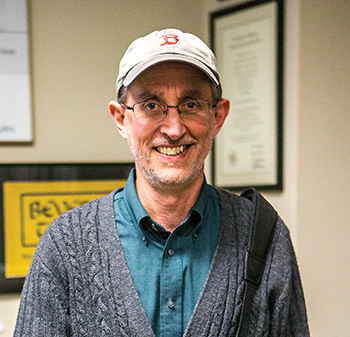Social media mogul
Dr. Chris Underation uses new means to exemplify journalism to students
Last summer Dr. Chris Underation, digital media and communication arts, broadcasting and journalism professor at Liberty University, was preparing for social media journalism, one of the several courses he teaches. In addition to preparing class material, Underation thought of different ways to get the class involved and interested in what he taught.
Underation said he valued students getting to know their professors in and out of the classroom and said this helps them to learn more. One of the lessons he planned for students was to create one social media news story a week about anything on or off campus.
Instagram, Twitter and Facebook are outlets Underation wanted students to utilize. After announcing this to the class he began to think of a way that the students would use the social media platforms, and he decided to do the assignment with them.
“I’m a professor that’s not always comfortable with the idea, ‘do as I say,’” Underation said. “I want students to ‘do as I do.’”
Underation began to post weekly stories about different professors in the digital media and communication arts department. His stories quickly became the social media campaign known as #HiddenLifeOfProfessors. The campaign featured weekly stories showing social media users what professors’ lives consisted of outside of the classroom.
Underation explained how some think the life of a professor is nice and easy.
“One of my friends told me, ‘You’ve got the greatest life in the world,’” Underation said. “And I said, ‘You don’t really know what I do.”
Underation mainly posted on Instagram as well as Facebook and Twitter. He received mostly positive feedback with a wide reach of people from all over the U.S. including a professor from UCLA.
“On one of my early posts, I heard from a guy who followed me on social media,” Underation said. “I’ve known him for a while. He’s in radio news. He retweeted it to his (Twitter) and his retweet said, ‘Here’s Chris Underation killin’ it like a boss,’ and I was flattered of course.”
Underation said today is different from when he was in college. When he was in school, getting to know a professor was a result of going to grab a burger with them or getting coffee or in some cases being invited over to their house for dinner.
Today Underation claims those walls have been knocked down, in a good way, by social media. Students now can find their teacher on Facebook and see what they do outside of class.
“I don’t have an issue with students knowing me through social media,” Underation said. “I don’t mind them knowing my stances on things, and I don’t mind them pushing back. This is all part of the educational process.”
He wants to get the point across that teachers need not fear social media. He emphasized social media is vital to communication between professor and student.
Underation said students complain about workload while teachers are doing an equal amount, if not more, and expressed the similarities between students and professors.
“While you’re griping about that five page paper they assigned you, they are having to write a 30 page paper and present it to their fellow egg-heads,” Underation said.
The campaign adds humanity to professors that most students will never see. It explains why the professor might be a little tired when they are teaching that four o’clock class.
“We’re kind of students too,” Underation said.
Underation made clear that he will continue the campaign through the spring semester, but since the class is over there will not be weekly posts like last semester.

